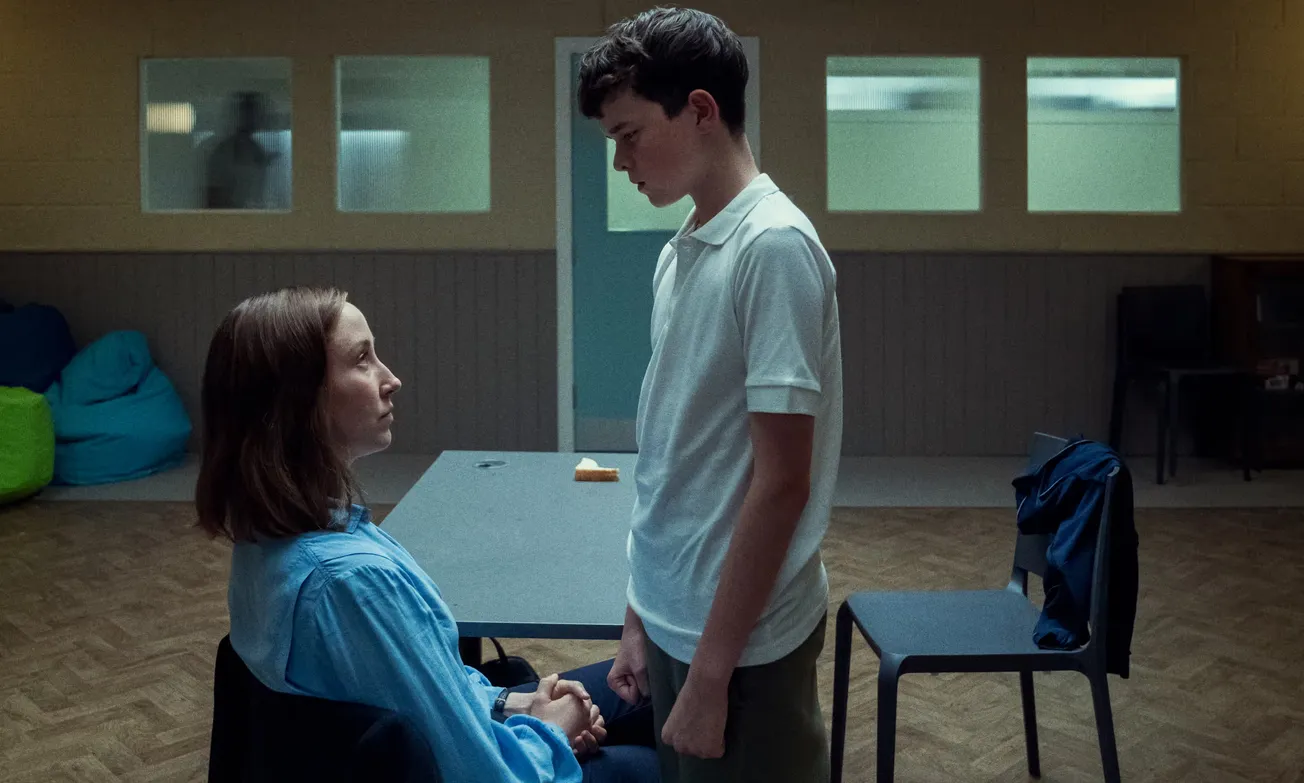On the evening of 3rd January, a polite, nerdy-looking 23-year-old moved into the Marples apartment block in the city centre, bringing no possessions with him. Some of his new neighbours had to lend him bedding so he could sleep comfortably that night. The impression that one of these tenants got from their first conversation with Ben Dunn Flores was that he was their baby-faced new landlord, who planned to spend thousands of pounds renovating the building, at no cost to them. This notion was certainly welcome — the building has seen much, much better days — but incredibly strange. The truth was even stranger.
A century ago, the Marples was an opulent seven-storey hotel. These days, after it was decimated during the Blitz and rebuilt, it looks more like shabby student accommodation. The hallways are dingy, the lift is out of action, the roof leaks and only one boiler works. A handful of residents tell me their windows don’t close properly; one claims she patched hers up with cardboard and tape. Last month, an assessment carried out by Roofdoctor Roofing Services, seen by The Tribune, alleged the Marples is in “seriously poor condition” and recommended that some areas are no longer used.
“There’s a reason why people live in places like this,” one resident tells me bluntly. “It’s because they can’t afford a deposit to move somewhere else.” Yet many of the people willing to put up with these conditions have fled the building since Ben — and his company Roost Rent — arrived on the scene. Earlier this week, a group of more than 20 residents, in a building with only 48 rooms that is not fully occupied, agreed to withhold rent for the foreseeable future. “It might not fix the building and we might all have to find other homes,” one tenant argued at a meeting to discuss the rent strike. But it was enough to hope that, by potentially sinking the company, they could stop Roost Rent “doing this to other people”.

She’s right to worry they might, because Roost Rent’s explicit goal is to expand massively over the next few years. The London-based start-up — recently described by Novara as a “bunch of tech nerds” hoping to “solve the housing crisis” — was founded by Ben and his 29-year-old business partner Andrew Bailie. The Marples is their flagship project and proof-of-concept. So far, Andrew told The Tribune last week, Roost Rent has “only housed 64 people and only in two cities,” namely the Marples’ residents in Sheffield and a handful of people in London, “whereas we have more than 10,000 people on our waiting list, that’s what we’re working on.” In a couple of years, he hopes the company will have a hand in hundreds of properties up and down the UK.
So what’s the pitch? When Roost Rent spoke to Novara in September, it was that the company was going to make it easier for people to start housing co-ops. Co-operative housing, as we’ve reported before, is a radical model which essentially involves becoming a joint landlord with your housemates. Everyone still pays rent, but only the amount needed for the mortgage and the property, without anyone turning a profit. In return for this sweet deal, tenants are basically running a small business in their free time, even submitting annual accounts. Co-op housing isn’t for everyone — many housemates struggle to even stick to a cleaning rota without falling out, let alone keep financial records — but they usually charge much cheaper rent and can fund significant home improvements, such as installing solar panels.
Ben and Andrew love co-ops, even though both admit during interviews with me that they’d never lived in one before starting a company to make them easier. Sheffield’s existing co-ops, however, do not seem to love Ben and Andrew. “We thought it sounded really dodgy when it first got set up,” a resident of the Fireside Co-op in Burngreave says of whatever is going on at the Marples. She’s sympathetic, but not at all surprised, that its residents are having a bad time. A Marples resident who has steadfastly refused to join the co-op says he knew something was fishy as soon as Ben mentioned having secured investment from venture capitalists. “Co-ops and VC money don’t go hand in hand.”

The basic promise Ben and Andrew made was that, in return for a 10% cut of the rent, they would make a form of housing that normally requires immense time and energy into a breeze. Ben, the tech whizz, would help create an app to simplify the fiddly legal and financial bits. For example, Andrew suggests, it could help co-ops skip the “really painful audit process” necessary to submit accounts by presenting them with a financial summary “more like Spotify Wrapped” — the cutesy graphics summarising users’ listening habits produced by music streaming app Spotify each year. Andrew’s sales experience, meanwhile, would allow him to convince wary banks and investors that housing co-ops are a good deal, making it far easier to get a mortgage. He claims it is purely “because no one understands co-ops,” that only a small number of “very over-subscribed” organisations will fund them — not because they are, by their very nature, not that profitable.
But what would happen, I wonder idly during my phone call with Andrew, if a co-op that Roost Rent helped create eventually decided they felt confident enough to go it alone? “Ultimately, they are our customers,” Andrew responds, after a slightly chilly pause. “They can tell us what to do from day one.” However after speaking to 38-year-old David Keogh, a Marples co-op member who essentially works a full-time unpaid job trying to keep the building running, it becomes clear that cutting Roost Rent out of the equation would be very difficult, if not impossible. The co-op’s rent is paid into an account that Ben and Andrew can withdraw money from, while the building’s owner refuses to communicate with anyone except Ben.

The building’s owner? That’s right, in a move that is antithetical to the fundamental purpose of co-operative housing, the Marples is still paying £14,000 rent a month to its landlord, Strike Property Ltd. On the phone, despite Andrew having previously suggested they were lured up north by the building’s “history and personality” and the innate charms of Sheffield, Ben admits Roost Rent selected the Marples as their flagship project because it was offered to them by one of Strike Property’s directors, after they’d unsuccessfully pitched him as potential investor in their company.
Deciding not to invest seems to have been a savvy move on his part. “Roost is an unprofitable, early stage company,” reads Andrew’s written response to a number of questions from The Tribune. They are currently “making a loss on the Marples” and have not been collecting their 10% cut. However, if things were going well, the rent paid by the co-op tenants would, in theory, cover the lease, the bills, most of the building’s maintenance, any improvements its members wanted to make, plus Roost Rent’s fee.
Obviously, it’s not possible to do that while offering cheap rents, like a normal co-op would. Indeed, since last year, the price for the cheapest rooms in the Marples have risen from £425 to £560 a month, while an en-suite would now set you back £600 a month. Andrew, having lived in the city for a few months before hightailing it back to London — allegedly because his girlfriend threatened to leave him if he didn’t — insists these rooms “are a good price for Sheffield”. (Though he tells me on the phone that he and Ben are both in the building “quite a lot of the time,” residents reveal he’s not been seen since March, while Ben spends at most a few nights there a month.) By contrast, Marples tenants argue the current rent is extortionate considering the state of the building. “If it was in really good condition and the rooms were all newly renovated,” one argues, “then £600 a month for an en-suite wouldn’t be terrible.”
Suffice to say, the building is not in really good condition. Roost Rent had promised they “would spare no expense fixing any outstanding issues before they handed it over to the co-op,” a member recalls, but this “just didn’t happen”. Ben and Andrew did paint some walls, although not very well. “We had to spend a concerted amount of time unfucking the work they did,” another co-op member says. While Roost Rent insists it has invested £50,000 into the Marples so far — neglecting to reveal how much of this money was in the form of zero-interest loans — it’s obvious this cash has not gone very far. Co-op meeting minutes show one of the boilers was “severely broken” back in May. It remains non-operational.

“The Marples is our first housing co-operative, and we feel a sense of responsibility towards the people who call it home,” Andrew insists in his written statement. “While there have been lots of challenges maintaining a large, complicated building, we are committed to finding a path forward with the owner and co-op members.” Even owner Strike Property admits that the Marples is not the easiest building to look after — so it's presumably a relief that the co-op is now responsible for some of this work. For example, the lease between Strike Property and the co-op states that the landlord now only has to pay half of the “reasonable costs incurred in replacing the boiler”. Roost Rent claims to be in the middle of negotiating with Strike Property over the repairs they’re still responsible for, although so far the only thing they’ve secured is a promise that the company will “fund a professional survey”.
Tenants in the Marples are thus paying more and yet receiving less from their landlord than they were before Roost Rent arrived. “This isn’t a legitimate co-op,” says 21-year-old Elwyn Knight, who was in the process of moving out when we spoke. “It feels like we’ve got two sets of landlords and no communication from either.” Tenants who were living in the building before Ben arrived were given the option to remain on their original tenancies, but even they have to deal with suddenly having around “20 first-time live-in landlords,” as one non-member put it. “I don’t want to talk badly about them,” they add, “but I don’t think all of them knew or understood what a co-op is.” Rather than doing things collectively, almost all the work has so far fallen to just two members — David and another who asked not to be named in this article — in exchange for them not paying rent.
Why on earth, you might be wondering, did these residents agree to become a co-op in the first place? The non-member suggests they were goaded into making “an uninformed decision” by Ben and Andrew, who they claim never “really explained” the responsibilities involved. A co-op member recalls explicitly asking Andrew what level of financial expertise they would need and was reportedly assured Roost Rent would arrange workshops to bring them up to speed. “If ever such a workshop was held, I have no knowledge of it.” David, meanwhile, says that Ben and Andrew’s pitch for becoming a co-op focused more on “frivolous talk about solar panels and communal gyms,” while others recall promises of supper clubs and installing a jacuzzi on the fifth floor. One former tenant is still driven almost apoplectic describing how often Ben and Andrew spoke about painting murals. “I didn’t need murals or a terrace on the roof, I needed a working lift,” she says.
One member claims he was never really convinced by Roost Rent’s pitch but says his hand was ultimately forced. In early February, when trying to cajole tenants into the co-op, Roost Rent said a rent increase announced by the landlord the previous month would be cancelled for those that joined. The anonymous member was unemployed at the time and couldn’t afford to pay more, so he did. “I don’t want this to reflect poorly on efforts to create co-ops across the country,” he says of the Marples’ situation in general. “But the behaviour of Roost Rent makes me think they’re not exactly aligned with the sort of people who normally create them.”
At one point during our conversation, I ask Ben what Roost Rent would have done if it arrived to find the tenants were entirely opposed to the idea of forming a co-op. “That didn’t happen,” he replies, “so I’m not sure I can answer that.” Roost Rent’s written statement reveals 11 people already living in the building were willing to join, although it’s unclear if this number includes Ben, Andrew and the three associates they temporarily moved in.
However, even if no one had been on board, it’s not clear it would have changed anything. Ben repeatedly points out that Strike Property signed a lease with the co-op, rather than with Roost Rent, but the only three signatures on it belong to the building’s owner, Ben himself and Andrew. Furthermore, Andrew’s signature is dated 22nd January — before the co-op was first pitched to the rest of the building. In the words of one tenant, it was “a bit of a hostage situation” from the very start, while others compare Roost Rent to a cuckoo laying eggs in another bird’s nest.

Attentive readers might recall that part of the original promise was that Roost Rent would design an app to make co-ops simple. “I’ve not heard a word about it since I moved in,” Elwyn says, although she’s not exactly been agitating for it. As an ambulatory wheelchair-user, she would have much preferred a ramp or a working lift, two things she says were promised when she viewed her flat and never delivered. When asked about this, Roost Rent responded: “As mentioned, we are having discussions with the landlord of the Marples, Strike Properties Ltd, about updates and repairs to the building. Large structural projects would require a partnership agreement and substantial funding.”
According to Andrew, Roost Rent has delivered a “pay app” for Marples members so far. David, however, says this “app” is a “web interface with very little functionality,” which can only be used to make payments or view a list of transactions. While Andrew’s written statement also notes they have received “recent funding to hire a team to work on further web-based solutions,” he’s keen to emphasise that the “magic thing” that makes co-ops work is the members themselves, joining forces. “That’s something that technology can be a tool for, but can’t replace.”
The magic hasn’t really materialised yet, something Roost Rent seems to find a bit vexing. The company is clearly keen to get on with its expansion plans and leave the Marples co-op to it. Only a few months after they all moved in, everyone connected to Roost Rent except Ben “just left, dumping everything on us, all the responsibilities,” one resident says. Ben moved out not long after. In the future, he explains during our call, the company plans to focus on buying properties rather than leasing them, specifically to avoid the kind of legwork the Marples has required. “With the owner-led model, we sometimes fall into helping co-ops more than we would like. That’s a different relationship to what we are looking to have.”
In fact, it seems their experience with the Marples has potentially put Ben and Andrew off co-ops altogether — multiple residents say they hear Roost Rent’s new focus is “tenant-managed properties”. (As one argues, it sounds like this “just means they don’t have to do fucking anything”.) In his typically vague fashion, Andrew claims the company’s new direction is “towards pulling together finance deals so communities can acquire their own home” while Ben, offering slightly but not much more clarity, explains they would finance properties with the help of funding from local councils. This change of direction for Roost Rent is fairly recent and coincides with Andrew replacing Ben as CEO, so it seems the details are still being ironed out at present.
And what of Roost Rent’s other promise, that they could bridge the gap between co-ops and investors? “Thanks to Marples, we have access to different pools of finances,” Ben claims on the phone. “We’re halfway down a number of conversations and looking to close those deals over the next few months.” However, it seems unlikely that anyone is going to bite. For example, Andrew eagerly mentions that he “used to work in the homelessness sector” during our first chat — specifically, he spent nine months working for Venture Studio, the investment arm of the homelessness charity Crisis. His former employer, however, wants to distance itself as much as possible. “It’s deeply concerning to hear that tenants are dealing with poor conditions at the housing co-op in Sheffield set up by Roost Rent,” a spokesperson from Crisis tells me, adding that the charity “is not associated with the start-up” and has rejected their investment bid.
At the meeting this week, members of the Marples co-op were informed that agreeing to a rent strike would probably “feed Roost Rent a poison pill”. They gladly voted to do so anyway. In fact, most members seemed to consider this prospect either irrelevant or actively appealing. “We think that the co-op is going to collapse because it’s built on a foundation of bullshit,” one tells me. “But, since people gave up secure housing to live here, we are quite content to see their business collapse off the back of it.”

Comments
How to comment:
If you are already a member,
click here to sign in
and leave a comment.
If you aren't a member,
sign up here
to be able to leave a comment.
To add your photo, click here to create a profile on Gravatar.







